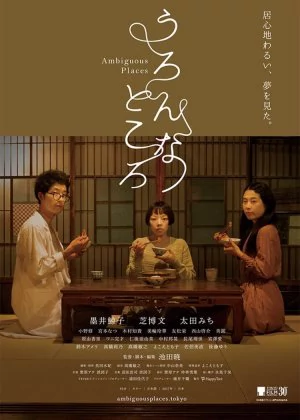Ambiguous Places

There is no lack of oddball cinema coming out of Japan, but with fewer people keeping an eye out for potential masterpieces, more and more films are starting to slip through the cracks. Though Akira Ikeda's Ambiguous Places [Uron na Tokoro] played at some renowned film festivals (like IFFR), it never landed a real breakthrough and quickly faded into obscurity once its festival run was over. Nothing about the promotional material screams "crazy and absurd" either, so you can imagine my surprise when I started watching what is no doubt one of the oddest films in ages.
![screen capture of Ambiguous Places [Uron na Tokoro]](/thumbs/img/articles/1200xauto/ambiguous-places-1.webp)
Ambiguous Places isn't an easy sell, I'll admit to that. Comedies are a tricky genre regardless, with many cultural elements determining whether audiences will take to the humor. Absurd comedy is an even trickier niche, as the perceived randomness and baked in unfamiliarity of the material is certain to push a large part of the audience away. Not content with the hurdles laid out before him, Ikeda managed to take things one step further by going for a completely dry and deadpan presentation. The result is a film that's either going to be hilarious, or incredibly grating.
When asked about the inspiration for Ambiguous Places, Ikeda cites his own dreams (and the dream logic that accompanies it). While that certainly explains some things, it doesn't even begin to clarify some of the weirder and more outrageous moments in the film. As someone familiar enough with Japanese society to spot several cultural references, it's clear that Ambiguous Places has at least some hidden layers, but it's probably better (and certainly a lot easier) to take it at face value and just enjoy it for the freakishly deadpan comedy that Ikeda keeps throwing your way.
For a film like this, the plot is surprisingly intricate, with three plot lines overlapping each other multiple times, and various characters popping up in each story, as the film finds itself a way backwards in time. The first story is about a woman who has a sea bug stuck to her head, the second story tracks a doctor who sets out to get some gloves made, while the final part follows a girl who causes a scene during a local theater performance. There is no clear point to any of these stories, instead they offer the perfect excuse to get to know the village and the peculiar people (and creatures) who inhabit it.
![screen capture of Ambiguous Places [Uron na Tokoro]](/thumbs/img/articles/1200xauto/ambiguous-places-2.webp)
Ikeda didn't have a roaring budget to spend, but he made great use of the money available to him. The charming rural setting is a nice bonus, but it's the stark framing and repetitive editing that really helps to sell the deadpan delivery of the humor. The effects are traditional and quite basic, but they're primarily used to add to the weirdness, and in that sense they're perfectly serviceable. Ambiguous Places isn't the best-looking film, and I'm sure better handling of lightning and color could've improved things quite a bit. That said, for a unique comedy, I don't mind lowering my visual standards a bit.
Ambiguous Places doesn't sport a particularly enjoyable or remarkable soundtrack, the soft piano tunes and focus on ambient sounds are pretty much par for the course. Still, Ikeda uses sound to his full advantage. The endlessly repeating conversations, the off-pitch singing and the utterly dry delivery of the dialogue create their own separate soundscape, one that isn't always pleasant to the ear, but made me laugh more than it should (I remember a similar scene in Gozu that also had me in stitches). A perfect example of how to make every aspect of a film work in its favor, even when the means are limited.
The cast is great, but it's difficult to single out anyone in particular. The actors were clearly instructed to ban all emotions from their body language and expressions, resulting in some rather abstract and alien performances. Every single character appears flat and lifeless, indifferent to all the glaringly weird stuff going on around them. It's a very peculiar style that drives the levels of dry comedy to extremes, and it's certain to be very divisive. Personally, I loved Ikeda's intense dedication to deadpan, as it really sets the film apart from so many others.
![screen capture of Ambiguous Places [Uron na Tokoro]](/thumbs/img/articles/1200xauto/ambiguous-places-3.webp)
It probably won't take you more than five minutes to get a good feel for the film. If you haven't cracked a smile by then, this is probably going to be a grueling ordeal to sit through. If, on the other hand, you find yourself mesmerized by these odd characters and their oddball behavior, the film has a lot more in store for you. Ikeda keeps digging up new surprises and reiterating on old ones, which kept the comedy fresh and had me constantly guessing what he would come up with next, even when the vibe of the film itself is extremely singular and one-note. When it's this unique, that's a strength, not a weakness.
Akira Ikeda had a vision when he made Ambiguous Places. It's hard to gauge whether he could handle different genres, or other types of comedy, having just seen this film it's also unclear how quickly I would tire of this particular style, but none of that really matters for now. Ambiguous Places is the purest form of comedy. A film that sets out to bewilder and amuse its audience in the most deadpan way possible, taking no shortcuts or concessions whatsoever. It's a film that may disappoint, but never because it's not weird or exceptional enough. Films like this are right up my alley, one of the best comedies in ages.